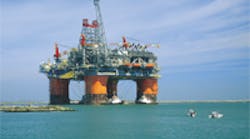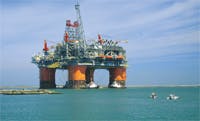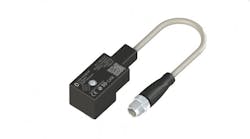The advent of lubricants with a greater environmental compatibility addresses a dilemma facing most operators. Although demand for oil has never been greater, the pressure facing companies extracting oil and gas from the Earth is a real challenge in the current environmental climate. A surge in environmental-related legislation in mature production zones like the North Sea has added to the complexity of offshore production. This trend is likely to continue, both in the North Sea, and in other oil-producing parts of the world.
Performance and sensitivity
Offshore production is especially challenging because marine environments are protected by numerous international bodies. Inevitably, this influences the choice of fluid to be used for machinery deployed on rigs and platforms. Products that carry less impact on delicate eco systems have, therefore, captured the interest of offshore operators.
When selecting fluids where there is a risk of spillage or leakage into the sea or other sensitive areas, you must consider the potential environmental effects of the fluid. However, you must consider the physical performance of the fluid to ensure that you don’t compromise reliability of the system. In fact, using an environmentally-responsible fluid that does not meet or exceed the performance of its conventional counterpart may actually be more detrimental to the environment long-term. This is because the inferior performance will require more frequent replenishing of fluid, not to mention the greater potential for spilling, attendant packaging, shipping, storage, and disposal costs — all at a cost to the environment.
If the alternative fluid is more aggressive towards elastomers than mineral oil, then there is actually an increased risk of a spill or leak from the seals. Other concerns include the compatibility of the environmental fluid with existing components and standard oils. Using a compatible fluid ensures that the conversion process is simple and straightforward with no attendant risks arising from the change.
Hydraulics is possibly the most sensitive technology we’ve had to consider because of its vulnerability on board a platform, where high pressures, high flow rates, and flexible hoses all contribute to the potential of a significant spill.
BioBar hydraulic oils have been formulated to be stable in service, so they don’t oxidize (combine with air) or hydrolyze (break down when wet) any more than the conventional oils they are intended to replace. This means the service life can be expected to be at least as long as that of conventional fluids.
The base oils of the BioBar range are compatible with the same range of elastomers as are used for mineral oils, so changeover is easy with no seal replacements required, and system integrity is maintained because the risk of a seal failure and subsequent leakage is not increased. Overall, the risk of a spill or leak is maintained at a low level, and the impact of any spill will be much reduced.
For more information, e-mail the author at [email protected] or visit www.castrol.com
|
Assessing environmental sensitivity Biodegradation is the tendency of a substance to break down in the environment from biological action. Naturally, it is important that substances are rapidly degraded should they enter a marine environment. Bioaccumulation is the tendency of a substance to permeate fatty tissue and accumulate in an organism, thereby entering the food chain. Toxicity is the ability of a substance to cause harmful effects to a marine organism. This the most obvious sign that a substance is harming marine eco systems. Castrol’s GreenField range offers significantly improved environmental characteristics in comparison to conventional equivalent products in at least two out of three of the key performance criteria. Therefore any of these products entering a marine environment will produce minimal impact. |
|
Put to the test In an industry where subsea control systems are being designed with longer offsets, and where higher operating pressures and wider and more extreme operating temperatures (from –20° to 200° C) must be accommodated, more versatile hydraulic fluids must be developed with the optimum rheology for the particular application conditions. Rheology, a combination of viscosity and compressibility, is an important factor in determining a hydraulic fluid’s ability to achieve its primary function — to transmit power efficiently and effectively from one point to another. Castrol has gone about this by generating detailed, accurate pressure, viscosity, and temperature data from actual physical testing of fluids. This ensures that system operating characteristics with the fluids can be accurately predicted, and a fluid with optimal rheology can be chosen to fit the exact field conditions of the proposed application. |


